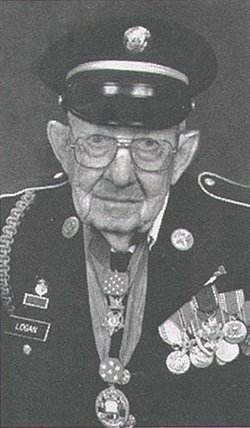An extract of the October 14, 1999 New York Times obituary best sums up Loganís experience:
James M. Logan, who won the Medal of Honor as an Army sergeant in World War II by single-handedly capturing a German machine-gun position in the first hours of the landing at Salerno, Italy, died on Saturday (Oct 9,1999) at a hospital in Longview, Tex. He was 78.
The cause was cancer, said the Rader Funeral Home in the nearby town of Kilgore, where he lived.
Before dawn on Sept. 9, 1943, American soldiers entered the German-occupied European continent for the first time. The United States 36th Infantry Division, untested in battle, joined American and British commandos and two British divisions in the Fifth Army's Operation Avalanche. They went ashore around the Gulf of Salerno, hoping to capture nearby German outposts, then seize the port at Naples, 50 miles to the north, and join with the British Eighth Army for a drive on Rome.
Sgt. James Marion Logan, a Texan with the 141st Infantry Regiment, 36th Division -- originally a Texas National Guard division -- was in the first wave of the beach assault.
The Italian Government had surrendered to the Allies the day before, but German tanks and machine-gunners occupying high ground raked the invading Americans with heavy fire. Nonetheless, by 7 A.M., three and a half hours after the invasion began, the 36th Division had moved 800 yards inland.
Sergeant Logan was advancing on flat terrain when the Germans counterattacked from a four-foot-high rock wall 200 yards farther inland. Exposing himself to fire from a machine gun along the wall that sprayed the ground close by, showering him with flying dirt and stones, he killed three Germans as they came through a gap in the wall, then headed for the machine-gun position.
As he dashed across the open ground, the Germans blazed away. But he got to the wall, then crawled along its base until he reached the machine gun. He jumped up, shot two Germans manning it, hurdled the wall and seized the gun. He swung it around and fired on fleeing German soldiers, then captured an officer and a private trying to sneak away.
Later in the morning, Sergeant Logan went after a sniper hidden in a house 150 yards from his company. He withstood heavy fire, shot the lock off the door, kicked it in and shot the sniper.
Sergeant Logan received his Medal of Honor in a ceremony outside Naples on June 6, 1944, D-Day. He was also awarded the Distinguished Service Cross, the Army's highest medal for bravery next to the Medal of Honor.
On Memorial Day 1997, in a ceremony at the Texas Capitol in Austin, he received the state's first Legislative Medal of Honor, for bravery in combat.
''You remember the people who died close to you,'' he said then.

PRIVATE CITIZENS SUPPORTING AMERICA'S HERITAGE
American
War Memorials Overseas, Inc.
War Memorials Overseas, Inc.
Logan James Marion
Name:
James Marion Logan
Rank:
Technical Sergeant
Serial Number:
Unit:
141st Infantry Regiment, 36th Division
Date of Death:
1999-10-09
State:
Texas
Cemetery:
Texas State Cemetery, Austin, Texas
Plot:
Hilltop, Section 4
Row:
C
Grave:
11
Decoration:
Medal of Honor; Distinguished Service Cross; Purple Heart
Comments:
